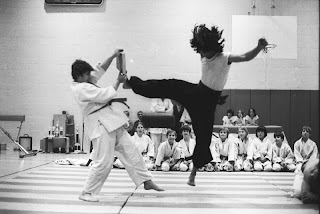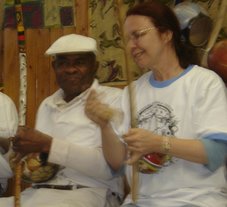
My Judo career collapsed with a bang and a whimper. UNIS held a tournament, and I was paired against the daughter of a diplomat from a Warsaw Pact country. I think she was a belt above my paltry orange status, but I held my own until I came down heavily on one knee. By heavily, I mean that I weighed well over 11 stone or 154 lbs (I'm just under 5'6" and hopelessly non-metric). My opponent went over to talk to her father while the ref decided whether we could go ahead. I might have been imagining things, but her stern-faced diplomat dad seemed to be telling her: "return with your shield or upon it" for the honour of the Soviet empire. After all, those were the days when the USSR was dosing female athletes with steroids to win Olympic gold medals. One small victory for Slovenia (not the real country), one huge step towards proving the validity of Communism and all its works. Alright, I was probably over-dramatising the whole thing, but then I was just 18 (though my daughters say I'm still a drama queen). I insisted on going through with the bout and lost by a fraction of a point. Soviet honour was saved and my opponent could return to hearth and home (I had less riding on the outcome - just personal pride). I spent the next few months recovering from a meniscus cartilage tear - a knee injury that is now common among athletes but was seemingly unheard of in the early 70s. When the x-ray showed nothing (the bones were fine), the doctors assumed I was making it all up to just get out of gym class (my gym teacher agreed). So I hobbled off and tried using a knee brace - wrong move, as it turns out, because it prevents the meniscus from moving and the cartilage from healing properly. It took years for sports medicine to catch up with my injury and heal me up before Capoeira damaged both knees more or less permanently.
There's a heartwarming postscript to this story. I put a Judo symbol next to my photo in the school yearbook and the teacher sought me out to thank me. He must have thought that my experience had embittered me against Judo and all martial arts. Far from it - I felt like a wounded warrior. Years later, my Judo skills would still stand me in good stead.






